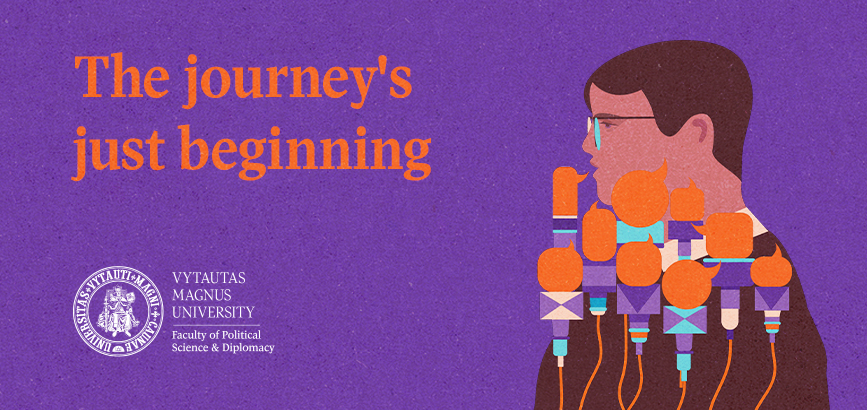About the Faculty
Vytautas Magnus University is one of the most attractive and innovative higher education institutions in Lithuania. The university is located in Kaunas city, which is progressively becoming an academic centre of Lithuania. The openness and liberal atmosphere of this university could be named as its distinguishing feature. The re-establishment of Vytautas Magnus University in 1989 was related to the process of regaining independence for Lithuania, as well as the formation of a democratic state and open society.
In 1996 the Department of Political Science was established in the framework of VMU as a response to the fast development of the burgeoning democracy in Lithuania and rapidly changing social consciousness. This department was the very beginning of the Faculty of Political Science and Diplomacy. Now our faculty is one of the two largest and brightest schools in Lithuania preparing political scientists, critics, diplomats, public administrators, and experts in media, communication and regional development.
Studies
Faculty of Political science and Diplomacy is the biggest faculty in Vytautas Magnus University. 6 bachelor degree and 10 master degree programmes are organised in the faculty. According to various ratings, these programmes are recognized as one of the best in Lithuania.
Community
The faculty is relatively young and therefore an extraordinarily creative organization, based on genuine communal relationships between students, scholars, teachers and the administration. We are all working together in a collegial atmosphere in the name of enhancing democratic values, tolerance, peace and wellbeing in Lithuanian society and East-Central Europe in general.
The faculty is an outstandingly active part of Vytautas Magnus University: scholars of the faculty participate in numerous national and international research projects, organize many national and international scientific conferences, workshops and summer schools, and initiate public discussions on the most relevant political and social questions.
The faculty’s students have formed several voluntary activity groups. The group called “Faculty Volunteers” is an organization uniting the most active students of the faculty. Its mission is to create a friendly and cozy faculty environment and build on its members’ various abilities, as well as nurture the creativity of students. Members of this organization are the main organizers of many of the faculty’s informal events – celebrations, concerts, etc.
A group of active students calling themselves the “Young Political Scientists’ Club” mainly organizes academic seminars and discussions, inviting out-spoken people, scholars and practicians to read public lectures. The club organizes an annual competition for young political scientists, the winners of which are provided with the opportunity to communicate with leading actors in Lithuanian public policy and members of the EU Parliament.
Journalism and political science students are involved in activities organized through student radio (VMU Radio). Students have the opportunity to design their own media programmes and take an active part in organizing seminars or lectures with professionals in media and politics.
Some students and staff of the faculty are involved in “Santara” (The Concordance), a Lithuanian club of cultural liberals, and the group “Studentų santara” (The Concordance of students) has also been formed. All events organized by this club are known for their creativity and high level of professionalism. This can be said not only about academic events, but about cultural performances as well, such as jazz concerts, poetry readings, exhibitions, etc.
Students of the faculty as well as the staff actively participate in the rich cultural life of the university: they organize an annual jazz festival “VMU Jazz-Joints”, poetry reading evenings dedicated to the most interesting poets of the world where all in the VMU community are welcome to participate, and initiateexhibitions in the VMU art gallery, plus many other regular events.
Values of the Faculty
• Academic liberty
• Internationality and interdisciplinarity
• Civil and societal thinking
• Communal integrity
• Openness
- Social and Political Critique Centre
- Dean’s office
- Department of Political science
- Department of Regional Studies
- Department of Philosophy and Social Critique
- Department of Public Administration
- Department of Public Communications
- Czezlaw Milosz centre
- UNESCO Chair on Media and Information Literacy for Inclusive Knowledge Societies
- Andrei Sakharov Research Centre for Democratic Development
- Northern European and Baltic Study Hive












